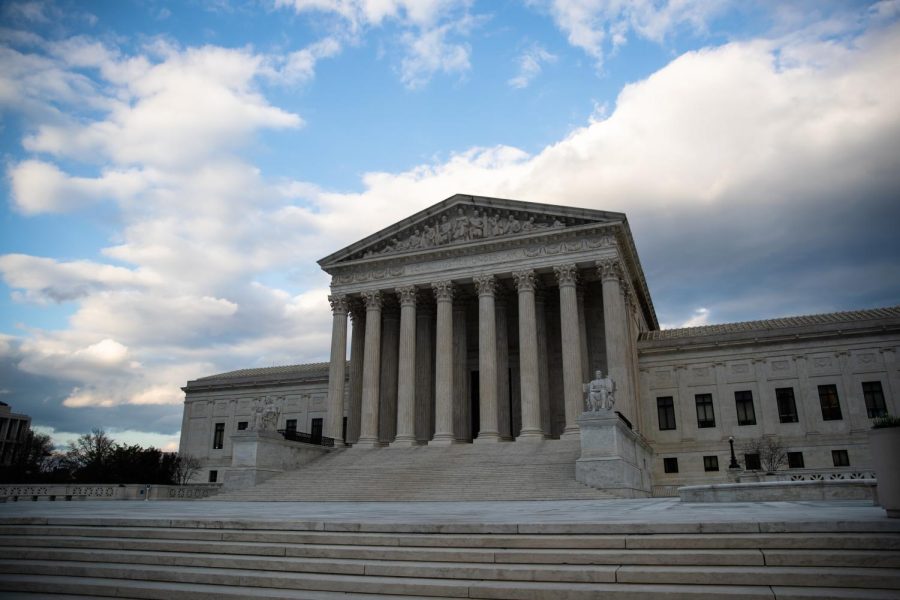Advocates move to focus on local solutions after SCOTUS limits EPA regulatory power
Local groups look to combat climate change locally instead of waiting for federal change.
The United States Supreme Court Building is seen on Sunday, April 3, 2022.
July 14, 2022
Iowa environmental groups are pushing for legislation at the local and state levels after the Supreme Court’s 6-3 decision to limit the Environmental Protection Agency’s (EPA) authority.
Matthew Casale, the Environmental campaigns director for the Public Interest Research Group that works with Environment Iowa, said in an email to The Daily Iowan, that Environment Iowa is looking to have congress strengthen the Clean Air Act by passing amendments to expand the power of the EPA.
Casale said Congress should also pass critical investments in clean energy, like expanded tax credits for wind, solar, energy efficiency, and electric vehicles. He also wants Congress to end taxpayer-funded subsidies and tax breaks for the fossil fuel industry.
“This is really the core of what has been proposed as the climate portion of the reconciliation package, and we’re calling on Congress to pass these urgent policies now,” Casale said.
He also said that on the state and local levels, lawmakers should focus on placing limits on power plant pollution, ending investments in new fossil fuel infrastructure, and committing to transitioning to 100 percent renewable power.
Elizabeth Wagner, a clean energy field organizer for the Iowa Environmental Council, said this leaves the EPA without the biggest tool in its toolbox to regulate emissions to combat climate change.
“It’s a setback in the transition to clean energy and decarbonization which are two things that need to be at the front of climate action if we are to prevent the worst effects of climate change from happening,” Wagner said.
Wagner said it’s time to focus on local solutions since climate change efforts have been dampened at the federal level.
Wagner said 100% Iowa, a movement run by the Iowa Environmental Council to get Iowa City and other cities in Iowa to transition to carbon-free electricity by the year 2030, is a solution she would like to see take lead in place of federal action.
“I think that this decision really highlights the importance of local solutions and local climate action. We know that local communities feel the impact of climate change the most intensely and now that we see there’s no forward action on climate at a state level,” Wagner said.
According to the Iowa Environmental Council, Iowa ranked second nationally in the amount of wind energy installed at the end of 2016.
The group’s website states that they seek a 24/7 carbon-free electricity plan, a plan that asks for more than a 100 percent clean energy pledge asking for more accountability for Iowa City and a few other cities around Iowa including Des Moines and Waterloo.
The Iowa Environmental Council plans to work toward a legislative agenda, focused on state-based action, this summer in response to the SCOTUS decision on the Clean Air Act.
The Environmental Law & Policy Center released a statement to the public on June 30, saying the U.S. Congress needs to act to prevent the worsening of Climate Change after SCOTUS took away a tool from the EPA.
Chief Justice John Roberts wrote in the Majority Opinion that the Clean Air Act, one of the first environmental rights legislation passed in 1970 that gave the EPA authority to set emissions levels, does not give the EPA broad regulatory authority to regulate greenhouse gas emissions from power plants.
The Clean Air Act only gave the EPA the power to put forth emissions standards but did not give it the ability to tell companies how to achieve those standards.
The Sierra Club, an environmental organization in the U.S., released a statement from Andres Restrepo, senior attorney for the Sierra Club’s Environmental Law Program, on June 30 detailing the organization’s feelings on the matter.
“This decision gives coal executives and far-right politicians exactly what they asked for by frustrating EPA’s efforts to set strong, effective carbon pollution standards from power plants that would help protect our communities and families,” Restrepo said.
Restrepo said as scientists warn that the world is running out of time to combat climate change, the administration and Congress need to act soon to minimize the effects of climate change and reinforce the EPA’s power.
This brings setbacks for Biden’s plan to cut the nation’s greenhouse gas emissions in half by the end of the decade and to have a decarbonized power sector by 2035.
Editor’s Note: The original version of this article stated that climate change efforts were halted at the state and federal level. It has been corrected to say efforts were dampened at only the federal level.



